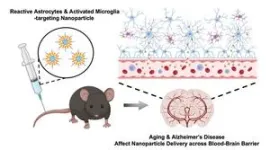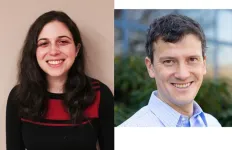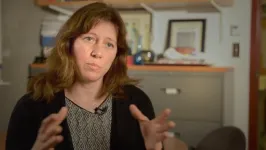(Press-News.org) The Association of Universities for Research in Astronomy (AURA) is pleased to announce that Dr. Christoph Keller has been appointed as the next Director of the National Science Foundation’s National Solar Observatory (NSO) succeeding Dr. Valentin Pillet, who will be retiring as Director in 2024. Previously Dr. Keller was Director of Science at Lowell Observatory in Flagstaff, Arizona. He will begin his five-year term on May 6, 2024.
“Christoph Keller is an outstanding choice for the next NSO Director,” said Matt Mountain, AURA President. “With his experience and vision for the National Solar Observatory, he is well positioned to lead NSO into the exciting future of solar science, ensuring our community can fully exploit the Daniel K. Inouye Solar Telescope and bring the next generation GONG network to fruition. My thanks also go to Valentin Pillet for shepherding NSO through the profound transformation into the resilient, exciting National Observatory we have today.” AURA manages NSO for the National Science Foundation, under a cooperative agreement.
Dr. Keller earned his Masters of Science in Physics and PhD in Solar Physics from ETH Zürich, Switzerland. He started at NSO in 1994 as a postdoc and then in 1995 he was hired as an Associate Astronomer. During his tenure there, Keller led efforts at the McMath-Pierce solar telescope, then the world’s largest solar telescope; designed, developed, built, and commissioned SOLIS VSM, which provides daily full-disk vector-magnetograms of the Sun; and developed initial science cases and technical concepts for the Inouye Solar Telescope.
In 2005, Dr Keller moved to Utrecht University in The Netherlands and became the director of its Astronomical Institute. After 10 years as a professor at Leiden University, he joined Lowell Observatory as Director of Science in early 2022.
“After some years away, I am truly excited to return to NSO! Solar physics has always been my first love, and I am thrilled to (re) join the solar physics community as we seek to understand our Sun and its impact on Earth and beyond. Solar physics’ moment is NOW: with NSO’s Daniel K. Inouye Solar Telescope online, we have the first images of the Sun at unprecedented resolution—right on time for the approaching sunspot maximum,” commented Dr. Keller. He continued, “We will work with a broad range of stakeholders to develop, build, and operate the next generation ground-based solar telescope network — as humanity reaches for the moon and beyond — and will generate the critical data needed to enable unprecedented space weather forecasting that can be used to protect everything from satellites to human space activity.”
The AURA Board of Directors endorsed the selection of Dr. Keller, the result of an extensive process with a talented pool of candidates. The Chair of AURA’s Board of Directors, Dr. Maura Hagan, said, “The AURA Board of Directors is delighted that Christoph Keller will be the next NSO Director. His strong leadership skills and extensive experience will build upon recent NSO achievements and bring a new direction to NSO.”
“Christoph Keller is a world-recognized astronomer with a solar physics background and a wealth of expertise in techniques such as spectroscopy and polarimetry, precisely those we use extensively in the suite of solar telescopes that NSO operates. This expertise will help advance our new flagship facility, the Inouye Solar Telescope, in the coming years,” noted the current NSO Director, Valentin Pillet.
Dr. Keller’s research expertise includes circumstellar disks and exoplanets; solar and stellar magnetic fields; and aerosols and trace gasses in planetary atmospheres, as well as development of innovative optical instruments for astronomy, remote sensing and biomedical imaging. He has authored or co-authored more than 350 publications and received the Friedrich Wilhelm Bessel award for outstanding research in astrophysics. He is a world-leading expert in high-accuracy polarimetry for astronomy and environmental sensing with the world’s largest telescopes and the latest space instruments for climate science.
"Under Valentin Pillet's leadership, NSF's National Solar Observatory has been transformed. With the launch of the Inouye Solar Telescope, NSO has flourished in its mission to understand the science of our Sun, and to help inspire and train the next generation of STEM professionals," said Carrie Black, NSF program director for NSO. "We are excited to welcome back Christoph Keller as he takes on this critical leadership role at NSO, which has become a truly incomparable resource for researchers across the U.S. and all over the world."
AURA congratulates Dr. Christoph Keller on his new position!
About NSO
NSO advances knowledge of the Sun as the dominant external influence on Earth and as the local archetype of a typical star. NSO supports facilities that provide forefront observational opportunities for the solar research community, and leads the operation of the Daniel K. Inouye Solar Telescope on Maui in Hawai’i. AURA manages NSO for the National Science Foundation under a cooperative agreement.
About AURA
The Association of Universities for Research in Astronomy (AURA), founded in 1957, is a consortium of 49 US institutions and 3 international affiliates. Although it began as a small organization with just eight founding members, AURA is now a thriving scientific institution with 52 members and over 1,700 employees.
AURA’s role is to establish, nurture, and promote public observatories and facilities that advance innovative astronomical research. In addition, AURA is deeply committed to public and educational outreach, and to diversity throughout the astronomical and scientific workforce.
Media Contacts
Shari Lifson
slifson@aura-astronomy.org
Evan Pascual
epascual@nso.edu
END
AURA appoints Christoph Keller as next National Solar Observatory Director
2024-01-04
ELSE PRESS RELEASES FROM THIS DATE:
Pollution-tracking citizen science project offers New York students a breath of fresh air
2024-01-04
WASHINGTON, Jan. 4, 2024 – Climate change is one of the biggest issues of the 21st century, a crisis that affects the fate of the entire world as well as our place in it. A warming Earth will destroy ecosystems, flood cities, and lead to countless suffering and death for people worldwide. Part of the challenge of dealing with climate change is helping people understand its complex impacts.
In The Physics Teacher, co-published by AIP Publishing and the American Association of Physics Teachers, researchers from Fordham University partnered with middle and high schools in the Bronx and Manhattan in a citizen ...
UMass Amherst researchers bring dream of bug-free software one step closer to reality
2024-01-04
AMHERST, Mass. – A team of computer scientists led by the University of Massachusetts Amherst recently announced a new method for automatically generating whole proofs that can be used to prevent software bugs and verify that the underlying code is correct. This new method, called Baldur, leverages the artificial intelligence power of Large Language Models (LLMs), and, when combined with the state-of-the-art tool Thor, yields unprecedented efficacy of nearly 66%. The team was recently awarded a coveted Distinguished Paper award at the ...
USC Stem Cell scientists develop a game-changing organoid model to study human cerebellar development and disease
2024-01-04
In a first for USC Stem Cell scientists, the laboratory of Giorgia Quadrato, an assistant professor of stem cell biology and regenerative medicine, has pioneered a novel human brain organoid model that generates all the major cell types of the cerebellum, a hindbrain region predominantly made up of two cell types necessary for movement, cognition, and emotion: granule cells and Purkinje neurons. This marks the first time that scientists have succeeded in growing Purkinje cells that possess the molecular and electrophysiological features of functional neurons in an all-human system. These breakthroughs in organoid-directed brain modeling have been published recently ...
Worm study raises concern about DEET's effect on reproduction
2024-01-04
Researchers have uncovered evidence hinting that the most common bug spray ingredient, DEET, might cause reproductive problems by affecting the formation of egg cells during pregnancy.
The findings come from a study in C. elegans — worms that don’t look like they have much in common with humans yet serve as surprisingly useful bellwethers of how toxins in the environment affect human reproduction.
Get more HMS news here
The research, published Jan. 4 in iScience, raises difficult questions. Chief among them is how to balance the possible reproductive harms ...
Hearing loss, hearing aid use, and risk of dementia in older adults
2024-01-04
About The Study: The results of this study that included 573,000 persons suggest that hearing loss was associated with increased dementia risk, especially among people not using hearing aids, suggesting that hearing aids might prevent or delay the onset and progression of dementia. The risk estimates were lower than in previous studies, highlighting the need for more high-quality longitudinal studies.
Authors: Manuella Lech Cantuaria, Ph.D., of the University of Southern Denmark in Odense, is the corresponding author. (doi:10.1001/jamaoto.2023.3509)
To access the embargoed study: Visit our For The Media website at this link https://media.jamanetwork.com/
Editor’s ...
Limited English proficiency and sepsis mortality by race and ethnicity
2024-01-04
About The Study: The findings of this study of 2,709 patients hospitalized with sepsis from 2016 to 2019 at an urban tertiary care center suggest a language-based inequity in outcomes. Further studies are needed to understand drivers of this inequity, how it may manifest in other diverse health systems, and to inform equitable care models for patients with limited English proficiency.
Authors: Neha P. Limaye, M.D., M.P.H., of Mount Sinai Hospital in New York, is the corresponding author.
To access the embargoed study: Visit our For The Media website at this link ...
Study reveals new genetic link between anorexia nervosa and being an early riser
2024-01-04
BOSTON – New research indicates that the eating disorder anorexia nervosa is associated with being an early riser, unlike many other disorders that tend to be evening-based such as depression, binge eating disorder and schizophrenia.
The study, which is published in JAMA Network Open and led by investigators at Massachusetts General Hospital (MGH), in collaboration with University College London and the University of the Republic in Uruguay, also revealed a link between anorexia nervosa and insomnia risk.
Previous research has suggested a possible connection between eating disorders and the body’s internal clock, or circadian clock, which controls a wide range of biological ...
Immune atlas at cell level points to new combination treatment for incurable childhood cancer
2024-01-04
Press release: Princess Máxima Center for pediatric oncology
EMBARGO: JANUARY 4, 2024 AT 11:00 AM ET (US)
A detailed 'atlas' of neuroblastoma tumors points to a new target for immunotherapy. Scientists from the Princess Máxima Center for pediatric oncology in the Netherlands mapped this childhood tumor at the level of individual cancer and immune cells. In doing so, they discovered a brake on the immune system that can be blocked with existing immunotherapy. The results in the lab are promising; preparations for a clinical study are underway.
Every year, 25 children in the Netherlands ...
The Colorado Center for Personalized Medicine highlighted as a leader in precision medicine in research and clinical care
2024-01-04
A new peer-reviewed study in the American Journal of Human Genetics highlights the work of the biobank at the Colorado Center for Personalized Medicine (CCPM), a world-class site for precision medicine in research and clinical care created in partnership with the University of Colorado Anschutz Medical Campus and UCHealth.
The paper focuses on CCPM’s research and personalized medical care.
“We’re one of the only institutions in the world that has accomplished the dual-purpose of using genetic information to accelerate scientific discovery in research while providing actionable clinical results to patients that ...
Treating tuberculosis when antibiotics no longer work
2024-01-04
In cooperation with research partners in Germany and France, the infectious disease specialist Dr Jan Rybniker and his team at University Hospital Cologne and the University of Cologne’s Faculty of Medicine have identified new, antibiotic molecules that target Mycobacterium tuberculosis and make it less pathogenic for humans. In addition, some of the discovered substances may allow for a renewed treatment of tuberculosis with available medications – including strains of the bacterium that have already developed drug resistance. The research has been published in the article ‘Discovery of dual-active ethionamide boosters ...



